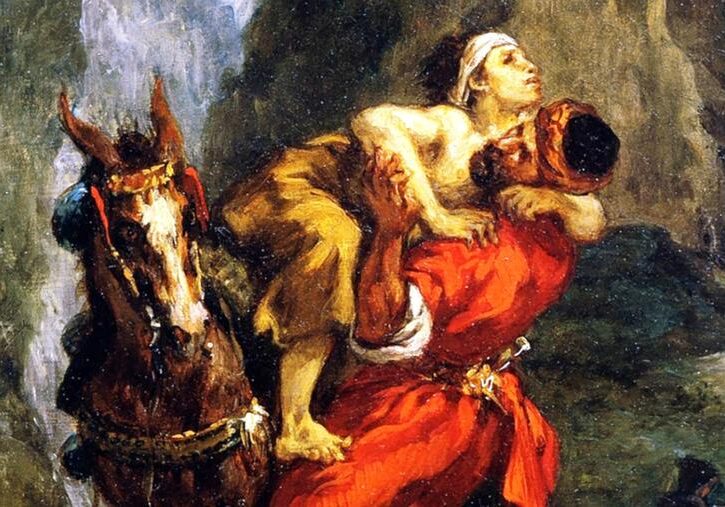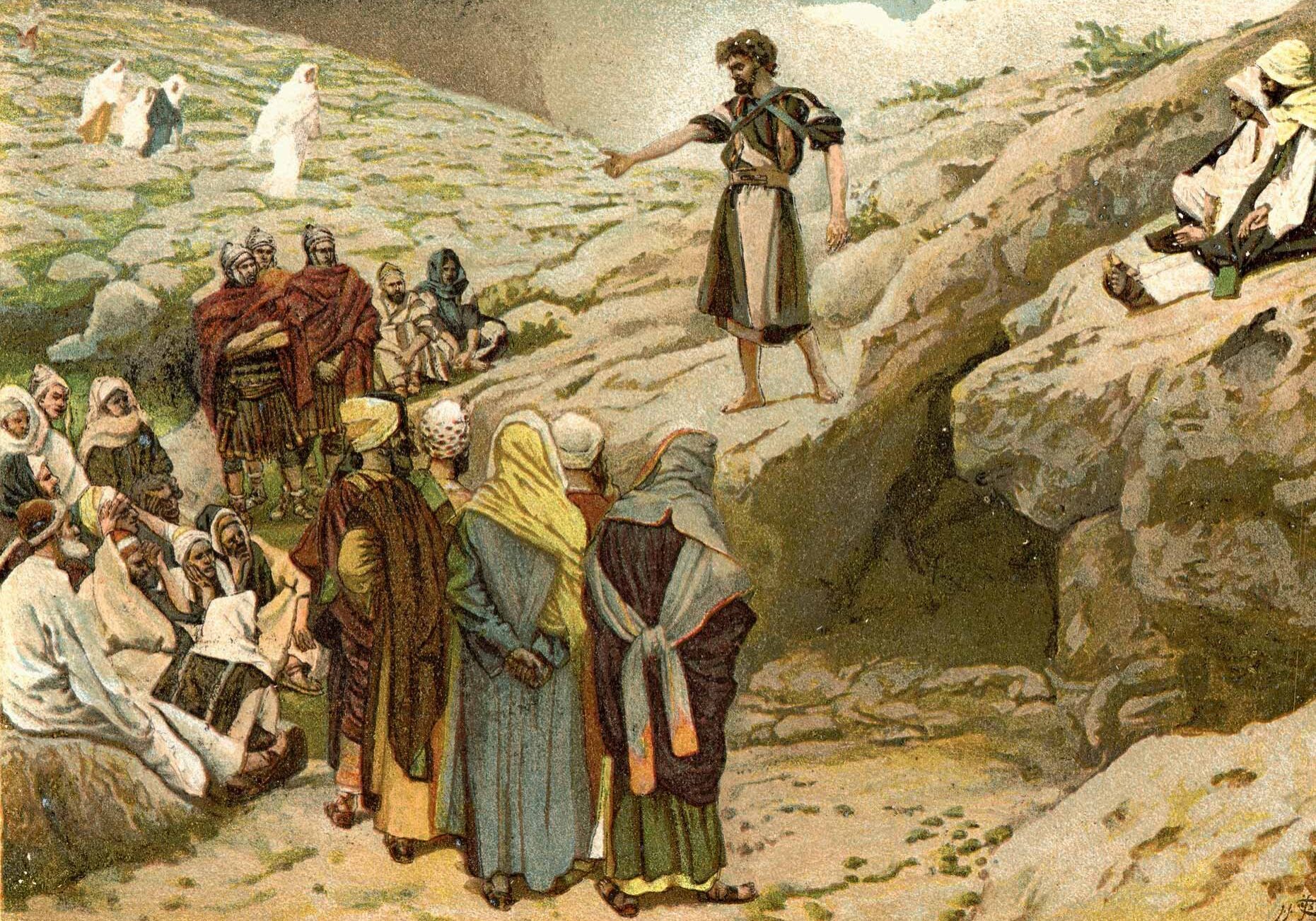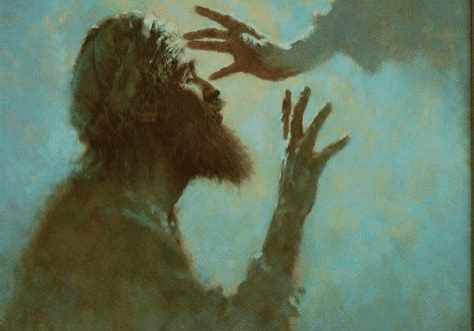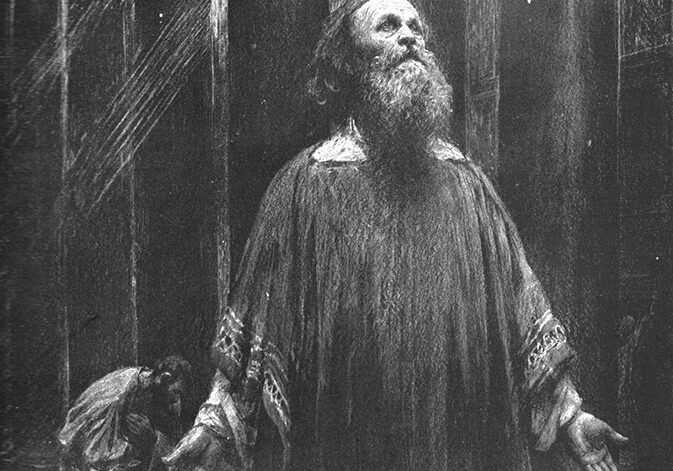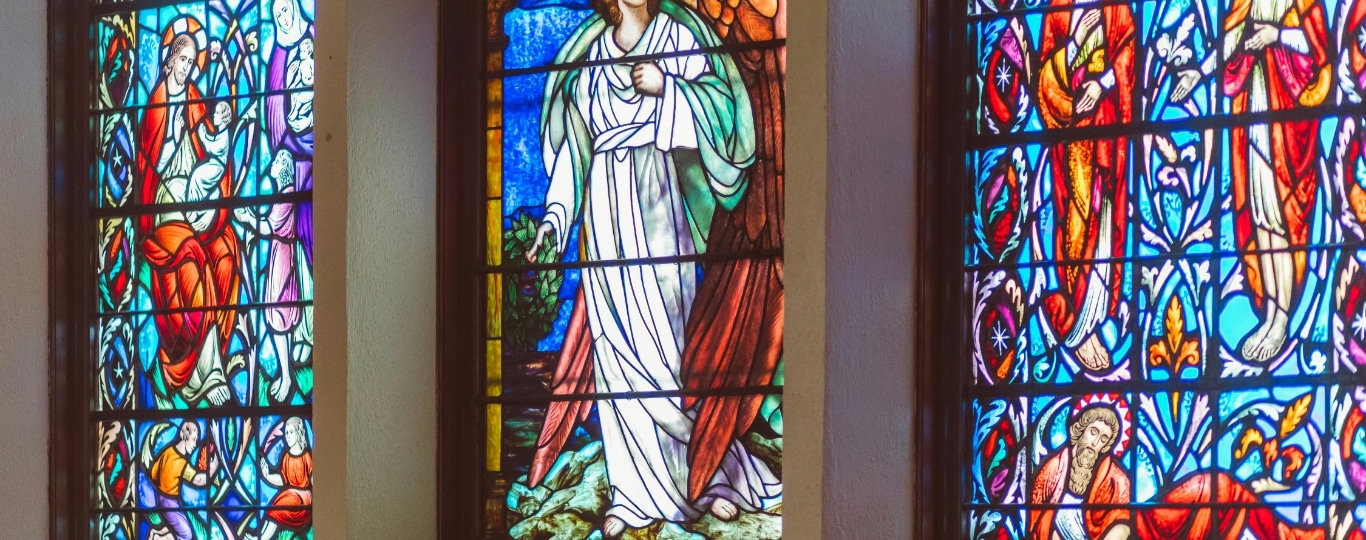†
R.D. Crouse says in his work, Images of Pilgrimage, “Wilderness is both curse and blessing – it is the place where fiery serpents lurk to wound, but it is also the place where the brazen serpent was lifted-up to heal. It is the dry and barren land where people starve, but it is also where the gift of GOD is made a supernatural food from heaven. It is the place of lawlessness, but it is also the place where the law of GOD is given and received. It is in the wilderness, the place of solitude, that GOD speaks thundering ugly [from a cloud of fire and smoke], and it is there that the tribes of Israel come to know themselves as GOD’s chosen people.”1
The Gospel of St. Mark opens with a picture of John the Baptist, declaring from the wilderness: “Prepare ye the way of the Lord, make his paths straight.” – This image should if we know the geography of Israel, and particularly Judea, bring into focus where the headquarters of John the Baptist resided. It was at Bethabara (house of the ford), on the east side of the Jordan River, about 20 miles east of Jerusalem. It was the wilderness, in a dry, dusty, and rocky area of Israel’s sovereign territory. And as R.D. Crouse said, being the wilderness, John the Baptist’s headquarters was in a place of curse and blessing.
Similarly, if we know the geography of our Bibles, we know that John was in this place for a purpose. St. Mark says, in 1:2-3, that John was there, because he was told to go there by GOD, through the prophets of the Old Testament. We read: “Behold, I send My messenger before Your face, who will prepare Your way before You … The voice of one crying in the wilderness: ‘Prepare the way of the Lord; Make His paths straight.’” – These two statements come from two different Old Testament books – one from Malachi 3:1, and the other from Isaiah 40:3. The first is a promise of GOD in the last book of the Old Testament oracle, that GOD would send a forerunner before His Messiah – His Anointed One, who was to ‘deliver His people, Israel, from their enemies, that they might serve Him without fear, in holiness and righteousness before Him all the days of their lives.’ (cf. Lk 1,74-75)
Zacharias, John the Baptist’s father, a Levite priest, on the day of John’s circumcision and naming, had his tongue loosed by GOD. He spoke a prophecy about his son and the coming Messiah. — Zacharias said, “And you, child, will be called the prophet of the Highest; for you will go before the face of the Lord to prepare His ways, to give knowledge of salvation to His people by the remission of their sins, through the tender mercy of our GOD, with which the Dayspring from on high has visited us; to give light to those who sit in darkness and the shadow of death, and to guide our feet into the way of peace” (St. Luke 1,76-79). – Malachi saw John’s day and the message he would preach, and he prophesied for GOD these words five hundred years before Zacharias’ prophecy: “‘Behold, I send My messenger, and he will prepare the way before Me. And the Lord, whom you seek, will suddenly come to His temple – even the Messenger of the covenant, in whom you delight. Behold, He is coming,’ says the Lord of hosts” (Malachi 3,1). – John was the Messenger of the LORD to prepare His way, whose way began in the wilderness.
Further, John the Baptist and his mission are described in Isaiah 40:3. There we read about the meaning of this voice crying in the wilderness, “Prepare the way of the LORD; make straight in the desert a highway for our GOD.” – The meaning of this phrase, everyone in Isaiah’s day, and John’s, would have understood. – The roads in the time of Christ, and certainly seven hundred years before, when Isaiah was ministering to Israel, were not paved. They were quite rough and violent by our standards, with great undulations and potholes. So, when the king was coming to town, the people were called out to go and prepare the way of the king; to make straight every path and smooth out the highways, so that the king would have a straight and flat ride into the city. In this way, he would be pleased with his subjects, and the care they had taken for his arrival, such that he would bless them, and they would find favor in his sight. This was an aspect of bearing good fruit as a citizen in that kingdom. To prepare the highway into the heart of the city – into the heart of every citizen – this was the desire of the king.
Yet, John was not echoing Isaiah’s words in hopes of calling the people of Israel to prepare the physical way of the LORD, to make straight His paths for the sake of a smooth ride in His chariot as He rode into Jerusalem. Instead, John was echoing Isaiah’s words, calling on the people of GOD to prepare their hearts and minds – viz., the virtue of their moral character and heart’s devotion – for the appearing of, as Malachi calls Him, ‘the Messenger of the Covenant, in whom you delight.’ — Israel understood this message plainly, for they had been waiting for this forerunner and the Messiah for centuries. — Anna, the aged prophetess, and daughter of the tribe of Asher, when she met the holy family in the Temple on the day of JESUS’ presentment to the priests, expressed this sentiment, as the Holy Scriptures say: “And coming in that instant she gave thanks to the LORD, and spoke of [the Child JESUS] to all those who looked for redemption in Jerusalem” (St. Luke 2,38).
Now, the most striking thing about this narrative, should be the ‘backdrop’ in which GOD sends His messianic minister. – He sends him to proclaim the coming of the Anointed One, in the wilderness! – As we alluded to earlier, the wilderness was an important spiritual place, symbolically and strategically for Israel, in their relationship with YAHWEH GOD. As R.D. Crouse said at the opening of this conversation, ‘It is in the wilderness, the place of solitude and risk, that GOD speaks thunderingly ugly, and it is there that the tribes of Israel come to know themselves as GOD’s chosen people.’ — There was an ugliness to John the Baptist’s message, and it acted as a warning for those who rejected his proclamation to prepare their way and ignored his exhortation to repent and be baptized. He said, “Therefore, bear fruits worthy of repentance, and do not think to say to yourselves, ‘We have Abraham as our father.’ For I say to you that GOD can raise up children to Abraham from these stones. And even now the ax is laid to the root of the trees. Therefore, every tree which does not bear good fruit is cut down and thrown into the fire” (St. Matthew 3, 8-10).
“When Israel forgot her holy calling and her eyes turned again towards the unclean things of spiritual Egypt, she had to learn again the lesson of the wilderness … Only in the strange land of the wilderness will Israel discern the word and will of GOD.”25-26 — Thus, John called on Israel to repent and turn back to GOD, and to evidence this by washing themselves of the habits of their old fruitless lives, and bearing true spiritual fruit of righteousness unto GOD. – This message is as important for the New Testament Church as it was for the Old Testament Church. – When we forget our Christian calling because of the ease and safety of our comfortable spiritual conditions – when we lose sight of the ever-present risk of spiritual blindness that is possible for us in the bright light of progressive humanism – when we allow the waters of emotional ambivalence to begin to boil around us because of tribulation or sorrow, causing us to wane from holy desire of GOD’s Word and Sacrament – at that moment, we forget what it is to desire GOD. We forget what it is like to long for His word – for His leading – for His peace that passes all understanding – and for the refreshment of soul, heart, and mind through His blessed Body and Blood. Further, in such a condition, we begin to forget our responsibility to Him, and His call for us to bear fruit of righteousness for His Glory.
In such times as these, we need to be brought back to the wilderness, where the reality of life in covenant with GOD ALMIGHTY is made plain. The wilderness: the place where blessing and curse are irresistible to our spiritual senses. The wilderness: where we are left without excuse as to what awaits us if we accept or reject the calling of GOD’s messenger to repent and turn back to GOD in holiness and righteousness. – The wilderness: where the discerning Christian is confronted with GOD’s austere message of plain frankness: ‘‘Repent, for the Kingdom of Heaven is at hand” (St. Matthew 1,2).
John did things and said things, because undergirding the Baptist’s words and exhortations, was a promise to the faithful in Israel. — IF, the faithful remnant of Abraham, Isaac, and Jacob would make the ruts in their lives level and plain, and walk a straight, virtuous path with their GOD, then, as Zacharias said, the Dayspring from on High would visit faithful Israel. The Messenger of the Covenant would come as the True Gardener and Second Adam, with living, spiritual water that causes the barren wilderness to blossom and bloom with virility and life. — If the faithful in Israel would truly repent and turn from their sins, they would receive the blessings of the Covenant, just as the sun rising on a well-watered valley brings forth light and life. Isaiah unveils this covenantal promise of GOD in Isaiah 35,7ff. There we read: “And the parched ground shall become a pool, and the thirsty land springs of water: in the habitation of dragons, where each lay, shall be grass with reeds and rushes. And a highway shall be there, and a way, and it shall be called ‘The way of holiness’ … And the ransomed of the LORD shall return and come to Zion with songs and everlasting joy upon their heads: they shall obtain joy and gladness, and sorrow and sighing shall flee away” (Isaiah 35, 7-8a & 10).
The most prolific vision that GOD gave His people, was that of an oasis in the desert. The image was of Himself as the Oasis, and the desert, the hearts of His people. Yet, unlike a natural oasis the water that proceeds forth from GOD, is spiritual, not physical. The water that flows from GOD, is His Holy Spirit, and just like water in the desert, the Holy Spirit causes new birth, new growth, and new bountiful godly fruit, where before there was nothing but dry spiritual rocks, stones, and sand. In Isaiah 44,3-4, GOD describes this outpouring of His living water and the effect it would have on the dry, barren land called Israel. He says, “For I will pour water upon [Israel, my chosen], who is thirsty, and floods upon the dry ground: I will pour my Spirit upon thy seed, and my blessing upon thine offspring. And they shall spring up as among the grass, as willows by the water courses.” – When the people of GOD are in the wilderness of the soul, and they cry out to GOD in repentance and faith, GOD makes waters flow out of the dry land, by His Holy Spirit, and causes new life to break forth. – And at that moment, ‘the parched ground becomes a spiritual pool of life, and the thirsty land springs of water that water the grass of the field and the herb of the tree.’
Only GOD can bring about such transformation (viz., water in the wilderness) – only in Him, do spiritual places, the hearts, minds, and souls of people, once dry, burning, and thirsty, are caused to overflow with the life of the Spirit, like a fresh spring in the desert, luscious and green. – This blessing, this promise of refreshment and renewal, as the Jews knew, was bound up in the arrival of the Messiah – the Anointed One – the Christ. – And, GOD’s Messiah, JESUS, who is called the ‘Covenant Bearer’, was to be announced by His forerunner, John in the wilderness.
And, as promised, John proclaimed, and JESUS came. The LORD fulfilled all righteousness, and He opened a new way – a highway of holiness to all who would follow Him in His new movement. That way is through faith, repentance, and the holy waters of Baptism. The waters symbolize death, wherein all who follow Christ, as He has gone before, being baptized by John, must make their paths straight, too. We must descend into the depths of Christ’s death by faith, and then be raised again to new life by the power of the Holy Spirit. And in our spiritual resurrection from spiritual death, we must thirst and hunger for Christ and the sanctifying work of His Spirit, like a desert longing and thirsting for holy water. — Further, our lives must become a “causeway raised above the surrounding countryside [emblazoned with the trappings of the world, the flesh, and the devil], such that it is unmistakable”2 who we are, and Who we serve.
Dear church, the Way has been opened for us. — But to enter, we must heed the words and exhortations of the Baptist. If you or I have forgotten our Christian calling and the lives we are to lead, and why we are to lead them – we need to return to the wilderness. The wilderness, the place of both curse and blessing – the place where fiery serpents lurk to wound, and where people starve. But in Christ, in His Way of Holiness, the wilderness is also a place of renewed blessing, revitalization, and new life. Though the wilderness is the place of solitude, where GOD sometimes speaks thunderingly ugly, it is also the place where the faithful members of the remnant of Israel, Holy Mother Church, come to know themselves as GOD’s chosen people – the City of Truth – the Mountain of the LORD of Hosts. Therefore, let us ‘prepare the way of the LORD in our hearts and minds, making His paths straight into our lives.’
Brothers and sisters of St. Mark’s, “Let your hands be strong, you who have been hearing in these days, these words by the mouth of the prophets” (Zechariah 8,9). Then, we will be able to bear the fruit that GOD desires, showing ourselves truthful in our repentance and faith. Let us, therefore, take hold of our faith in Christ, being “fervent in spirit; serving the LORD; rejoicing in hope; patient in tribulation; continuing instant in prayer; distributing to the necessity of saints; given to hospitality” (Romans 12,13). Then, together, as one body in Christ, we will walk on the raised causeway of holiness, fulfilling the ‘great commission’ that GOD has called us to fulfill in Ellis County. — In the Name of the Father, the Son, and the Holy Ghost. Amen.
1 Crouse, R.D., Images of Pilgrimage: Paradise and Wilderness in Christian Spirituality, (London : Darton, Longman, & Todd Ltd., 2023), 25.
2 Motyer, J. Alec, Isaiah: Tyndale Old Testament Commentaries, (London : Intervarsity Press, 1999), 245.
Join Us for Biblical Worship, Study, & Fellowship
Sundays:
Morning Prayer 9:45 am
Coffee & Catechesis 10:30 am
Holy Communion 12:00 pm
Thursdays:
Holy Communion 6:00 pm
Recent Sermons
